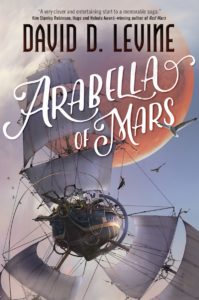An interview with David D. Levine.
David D. Levine’s debut novel ARABELLA OF MARS is a delightful novel set in the Regency Era with a science fiction/steampunk twist. It’s an adventure filled with airship battles in the solar system, romance, drama, broken hearts and bones, automata, forests on asteroids, and settlement on a life sustaining Mars replete with its own culture. The novel’s heroine is passionate, crafty, and above all engaging. ARABELLA OF MARS left me yearning for more time in this poignant world. In this interview, I asked David about his creation of Arabella’s world.
 I liked that Arabella wasn’t a man in a woman’s body. Her sensibilities and problem solving for a woman of her status respected the conventions of the time period. But she wasn’t a Mary Sue either or a Miss Marple trying to solve a problem. She was smart, deceitful, worked alongside her male counterparts, yet in her private moments we saw the personal effect of her daring choices. She feels like you wrote about someone you admire. Can you tell us who Arabella is to you.
I liked that Arabella wasn’t a man in a woman’s body. Her sensibilities and problem solving for a woman of her status respected the conventions of the time period. But she wasn’t a Mary Sue either or a Miss Marple trying to solve a problem. She was smart, deceitful, worked alongside her male counterparts, yet in her private moments we saw the personal effect of her daring choices. She feels like you wrote about someone you admire. Can you tell us who Arabella is to you.
I know a lot of writers who refer to their projects by the main character’s name — for example, “I’m working on Alfreda all this month” — but I’m usually not one of those; I usually start with the worldbuilding and come up with a character who exists in that world second (or third, after the plot). Also, the main character’s name is usually subject to change right up to the last minute. But Arabella is different. She has been Arabella from the beginning and this project, which has grown from a standalone novel to a three-book series and might grow further, has always been called Arabella. She’s someone who fights her society’s strictures and lets nothing stand in her way, but is still vulnerable and somewhat naïve. I admire her and I feel protective of her, and this is something that’s never happened to me with any of my own creations before.
Mars is a new and exotic settlement where European colonization and commerce abound. Arabella’s father is a successful business man. Arabella loves growing up on Mars and she takes great interest in this world which includes romping around with her brother, learning the culture from her Martian nanny, and taking an interest in mechanical gadgets. Despite her aptitudes, her father decides to send her home back to conventional England. Can you tell us about her father, what motivates him and why, despite his pioneering attitude, he decides to send Arabella home?
Arabella’s father is much more conventional than his daughter. Although he loves all his children, Michael is his firstborn, his heir, and his only son, and as a man of his era he is more strongly attached to Michael than to Arabella. But he does love and support her, and — as someone who left his own home planet to seek his fortune — he admires her adventurous nature more than her mother’s conservative one. When Arabella’s mother puts her foot down and demands to take the children “home” to Earth — a planet they have never even visited — he would like to keep both Michael and Arabella with him, but feels compelled to compromise. This doesn’t appear on the page, but he never really reconciled himself to this decision, and the question of whether or not he did the right thing nagged him until he died.
Your world building is persuasive, yet deft in its execution. You pay homage to early steampunk while touching upon colonization, xenophobia, but you set it the Regency Era rather than in the traditional Victorian Era. What is it about this time period that excited you?
You can blame Patrick O’Brian, whose Napoleonic War novels combine historical accuracy, adventure, and wit. I’m a great fan of those novels and when I had the idea of an interplanetary adventure in a world where the solar system is full of air it wasn’t a hard decision to set it in that period. It was a time of exploration and adventure, when the wider world was known but not well-known, and when a talented man (and why not a woman as well?) could be a warrior, a scientist, an inventor, an artist, and a diplomat all at once. Also, Mary Robinette Kowal and Naomi Novik showed that there was demand within the SF&F field for stories set in that era.
I appreciated the restraint in your approach on the issues of colonization and xenophobia – they became elements in good story telling and steampunk world building. Arabella’s reactions show, rather than simply tell, the issues. Why was it important to address these issues?
We live in interesting times, and questions of what is right and wrong when dealing with other genders, races, and cultures — and, indeed, how these distinctions are defined or if they even exist — seem more contentious now than ever before. These questions apply with equal force to history. Knowing what we know now, should we consider Columbus a hero or a villain? I felt that it would be dishonest, even immoral, to write a novel that ignored these questions… but, at the same time, it had to be a rip-roaring adventure. I hope that I’ve succeeded with both those aspects.
Tall, dark and handsome, Captain Singh, captain of the airship Diana, has a commanding and professional presence despite being the strong, silent type. Can you tell us more about him, who he represents, and what inspired his character?
Captain Singh, like Arabella, is an outsider who has nonetheless achieved a degree of success within his society — but, because of his outsider status, may see what he has achieved taken away at any time. I wanted someone Arabella could look up to and be inspired by, yet also someone who might be a little intimidating until you get to know him. He’s also someone who, because of his unique perspective, is willing to take a chance on another outsider. I knew early on that he would be Indian, to amplify the echoes of India in my version of Mars, but his background and personal history changed frequently as the book developed.
Aadim, the clockwork navigator – I can’t let end this interview without knowing your inspiration for Aadim. Despite being silent (except for the sounds he makes when he receives information to calculate navigations), he feels like a very real, yet mysterious character and he’s almost creepy because his movements feel like human reactions. When I think about it, we attribute a lot to our devices and machines. Was your treatment of Aadim in this manner a comment on our relationship with our devices or was it about the possibilities the steampunk writers saw in this world?
He is, of course, inspired by the Mechanical Turk, a chess-playing automaton of the 1700s (which was, alas, a fraud with a person inside). Originally I thought that most ships in this world would have these automaton navigators, necessitated by the difficulties of navigating in three dimensions, but as the story grew I decided to make him unique. He also provides a bond between Arabella and Captain Singh, due to their shared interest in complex automata. I had a lot of fun making his actions and reactions ambiguous, right on the edge of the Uncanny Valley. Is he completely plausible, given the technology of the early 19th century? No, not really, but this is a fictional world after all.
Thank you very much for this opportunity! I’m glad you liked the book and I hope many more people do.
Thank you for a great interview David! ARABELLA OF MARS is now a favorite! If the interview wasn’t enough to convince you to get the book, dear reader, perhaps this blurb will: Arabella Ashby is a Patrick O’Brian girl in a Jane Austen world — born and raised on Mars, she was hauled back home by her mother, where she’s stifled by England’s gravity, climate, and attitudes toward women. When she learns that her evil cousin plans to kill her brother and inherit the family fortune, she joins the crew of an interplanetary clipper ship in order to beat him to Mars. But privateers, mutiny, and insurrection stand in her way. Will she arrive in time?
 David D. Levine is the author of novel ARABELLA OF MARS (Tor 2016) and over fifty SF and fantasy stories. His story “Tk’Tk’Tk” won the Hugo Award, and he has been shortlisted for awards including the Hugo, Nebula, Campbell, and Sturgeon. Stories have appeared in Asimov’s, Analog, F&SF, Tor.com, and multiple Year’s Best anthologies as well as award-winning collection Space Magic from Wheatland Press. David is a contributor to George R. R. Martin’s bestselling shared-world series Wild Cards. He is also a member of publishing cooperative Book View Cafe and of nonprofit organization Oregon Science Fiction Conventions Inc. He has narrated podcasts for Escape Pod, PodCastle, and StarShipSofa, and his video Dr. Talon’s Letter to the Editor was a finalist for the Parsec Award. In 2010 he spent two weeks at a simulated Mars base in the Utah desert. David lives in Portland, Oregon with his wife Kate Yule. His web site is www.daviddlevine.com.
David D. Levine is the author of novel ARABELLA OF MARS (Tor 2016) and over fifty SF and fantasy stories. His story “Tk’Tk’Tk” won the Hugo Award, and he has been shortlisted for awards including the Hugo, Nebula, Campbell, and Sturgeon. Stories have appeared in Asimov’s, Analog, F&SF, Tor.com, and multiple Year’s Best anthologies as well as award-winning collection Space Magic from Wheatland Press. David is a contributor to George R. R. Martin’s bestselling shared-world series Wild Cards. He is also a member of publishing cooperative Book View Cafe and of nonprofit organization Oregon Science Fiction Conventions Inc. He has narrated podcasts for Escape Pod, PodCastle, and StarShipSofa, and his video Dr. Talon’s Letter to the Editor was a finalist for the Parsec Award. In 2010 he spent two weeks at a simulated Mars base in the Utah desert. David lives in Portland, Oregon with his wife Kate Yule. His web site is www.daviddlevine.com.
